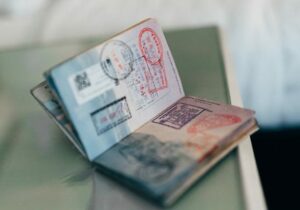Canada is one of the most desirable countries in the world, with its abundance of natural resources, friendly population, economic prosperity, and social, accessible cities.
Luckily, Canadian citizenship by descent is available to those born outside of Canada who have at least one parents that is a Canadian citizen.
Many people dream to obtain Canadian citizenship, so whether you are looking in from afar or are a current resident, take a look into this article to see if Canadian citizenship by descent is a possibility for you.
In this guide you will learn about:
What is Canadian citizenship by descent?
Citizenship through descent refers to acquiring citizenship because one or both parents were Canadian citizens when you were born. Canada ancestry citizenship can be passed down from generation to generation.
As of 2024, the Citizenship Act, with specific regulations, is working to restore citizenship by descent to second and subsequent generations.
Benefits of Canadian Citizenship by Descent

Access to a Canadian passport: This is a valuable travel document that allows visa-free or visa-on-arrival entry to numerous countries.
The right to live in Canada: Canadian citizens have the right to permanent residence and the ability to work and study in Canada without the need for additional immigration documentation.
Healthcare Benefits: Canadian citizens are eligible for the publicly funded healthcare system in Canada. This ensures access to medical services without significant out-of-pocket expenses.
Education Opportunities: Canadian citizens often have access to educational benefits, including lower tuition fees at Canadian institutions compared to international students.
Social Services: Canadian citizens are eligible for various social services and benefits provided by the Canadian government.
Right to Vote: Canadian citizens have the right to participate in federal, provincial, and municipal elections, allowing them to influence the political landscape of the country.
Citizenship for Future Generations: Canadian citizenship obtained through descent can be passed on to future generations born outside Canada under certain conditions.
Protection and Assistance Abroad: Canadian citizens can seek assistance from Canadian consulates or embassies when abroad. They are entitled to consular services and protection by the Canadian government.
Employment Opportunities: Canadian citizens may have access to more employment opportunities in Canada
Eligibility Criteria for Canadian Citizenship by Descent

You are eligible to apply for Canadian citizenship by descent if you meet any one of the following requirements:
- You were born outside of Canada to a Canadian citizen parent who was a citizen at the time of your birth.
- Your child was born outside of Canada, and you or the child’s other parent was a Canadian citizen when the child was born.
- If you were born outside of Canada, and one of your grandparents was a Canadian citizen when you were born, you might be a Canadian Citizen. With a Canadian-born grandparent, you may qualify under the Canadian citizenship by descent grandparent rule.
- If you were born in Canada and would like to obtain proof of your Canadian citizenship.
It may not be necessary to apply for Canadian citizenship, or you may simply want to apply for proof of citizenship. That may be the case if you fit into one of the following categories:
- You were born in Canada
- Your situation came under the 2009 or 2015 changes to the Citizenship Act
- You became a naturalized citizen
- Your parent applied for Canadian citizenship for you as a minor, and it was approved.
- You were born outside Canada, and at least one of your parents either was born in Canada or became a naturalized citizen when you were born.
This means that if one of your Canadian parents is already a citizen, then you do not need to apply for citizenship, but you may want to apply for proof of citizenship. You can do this through Immigration, Refugees and Citizenship Canada.
Citizenship-by-birth

To obtain citizenship by birth, individuals should meet the following requirements:
- Be born in Canadian territory
- Not have parents who are foreign diplomats or other individuals who are exempt from this principle
If you don’t meet the above criteria, Canada citizenship by Investment may be another option. Here, you can obtain Canadian citizenship through pathways like the Canada Startup Visa.
Canada Citizenship by Descent for Adopted Children
Those who are adopted by a Canadian citizen are not automatically given Canadian citizenship. Here are the requirements for adopted children:
- At least one parent is a Canadian citizen by birth in Canada or through naturalization at the time of the adoption
- The parent submits a citizenship grant application with the right documents and fees
Canadian Citizenship by Descent Application
It’s possible to apply for Canadian citizenship by descent online on the official Canadian immigration department website. From there, you can manage your application, upload documents, pay fees, and check the processing times.
You can also apply using the CIT 0001 form (Application for a Citizenship Certificate). You’ll have to fill out the required sections with your information, pay the fee, and send in your supporting documents.
Document Requirements for Canadian Citizenship by Descent

The documents required for citizenship by descent will generally include the following:
- A complete application form
- Two color passport-sized photos (Generally not older than 6 months)
- Proof of parental Canadian Citizenship (Citizenship certificate or birth certificate)
- Proof of applicant relationship to Canadian citizen (Adoption papers or birth certificate)
- In certain circumstances you may need to provide evidence of continuous citizenship. This is to prove the Canadian parent has not lost citizenship. Proof is generally in the form of a citizenship certificate, passport, or birth certificate.
- A current valid passport as proof of identity.
After gathering the documents, adding them to your application package, and submitting them either online or in person at a Canadian embassy or government office, you wait for a response.
Obtaining Canadian citizenship by descent has stringent rules and regulations. If at any point you are unsure of the required documents, it is best to speak with an immigration expert to prevent refusals or delays.
Canada Citizenship by Descent Processing Time
Processing doesn’t usually take that long, and you can expect a response within 20 business days for a standard application and 10 business days for an urgent one. However, each application is different and unique and may not conform to these estimations.
How to Apply for a Canadian passport
A Canadian citizenship certificate is not a travel or identity document. To travel internationally, you need a passport. You need your original Canadian citizenship certificate to apply for a Canadian passport.
Once you have obtained your Canadian citizenship certificate, it’s now possible for you to apply for a passport. The Canadian passport is highly powerful, giving you access to over 185 countries visa-free or visa-on-arrival. Applying for a Canadian passport is straightforward and can be done online or at a passport office. You must bring proof of citizenship and proof of residence, along with other relevant documents.
Changes to Citizenship by Descent in Canada
2009 Changes to Canadian Citizenship

- Those who became Canadian citizens on January 1, 1947, but later lost their status.
- Individuals born or naturalized in Canada on or after January 1, 1947, who had lost citizenship due to past legal provisions.
- Those born abroad to a Canadian parent in the first generation on or after January 1, 1947, who lost or never had citizenship under previous laws.
The 2009 law changes also limited citizenship by descent to the first generation, including:
- Children born outside Canada after April 17, 2009, can only inherit Canadian citizenship if at least one parent was born in Canada or naturalized as a Canadian citizen.
- Second or subsequent generations born abroad no longer automatically receive Canadian citizenship.
- Exceptions apply for children born to parents working for the Canadian government, Canadian armed forces, or other recognized public service roles abroad.
If you did not fit these changes, then you could still get Canadian nationality through the following routes.
- Apply for and get permanent resident status
- Submit an application for a grant of citizenship under section 5 of the Canadian Citizenship Act
2015 Changes to Canadian Citizenship

- Were born outside Canada after the first generation but became eligible due to one of the exceptions to the first-generation limit (e.g., children of Canadian government employees serving abroad).
- Were born or naturalized in Canada before January 1, 1947, but lost British subject status and did not automatically become Canadian citizens on that date.
- Were born outside Canada before January 1, 1947, to a parent who was born in Canada but did not acquire citizenship at the time.
- Were foreign-born and adopted before January 1, 1947, with at least one adoptive parent who became a Canadian citizen on that date and was eligible to pass on citizenship by descent.
- Had the same circumstances as above but were in Newfoundland and Labrador, where the relevant date for these changes was April 1, 1949 (when Newfoundland and Labrador joined Canada).
These amendments helped address gaps in citizenship laws, ensuring that more individuals with strong ties to Canada could rightfully be granted Canadian citizenship.
2024 Changes to Canadian Citizenship
Canadian citizenship follows the jus sanguinis principle, which means citizenship is passed down from a Canadian parent. Recent changes are designed to address this principle:
- In December 2023, the Canadian court declared that this first-generation rule was unconstitutional, and the government is introducing amendments to rectify it.
- As of 2024, the goal is to expand citizenship by descent to include children of second and subsequent generations. This means that children born abroad to Canadian parents, even if those parents were also born in a foreign country, could qualify for Canadian citizenship.
- The government plans to implement rules for second-generation citizenship. The new conditions may require the Canadian parent to have lived in Canada for a set time (such as 1,095 days or three years) before their child is born.
- Latest update: The government has set a new deadline for amending the second-generation principle—25 April 2025. The process is taking longer than previously expected.
Does Canada Allow Dual Citizenship?

However, you should check with your current nationality as to whether you can take on a second citizenship without renouncing your first one.
Look into the dual citizenship requirements for your birth or current citizenship beforehand to make sure. It’s possible that you may lose rights and privileges associated with your citizenship, lose travel and residency rights, it could affect your inheritance rights, and impact your right to vote, among other implications.
Although Canada allows dual citizenship, be sure to check the specific rules and regulations related to dual citizenship for your first nationality.
How Can Global Citizen Solutions Help You?
Global Citizen Solutions is a boutique migration consultancy firm with years of experience delivering bespoke residence and citizenship by investment solutions for international families. With offices worldwide and an experienced, hands-on team, we have helped hundreds of clients worldwide acquire citizenship, residence visas, or homes while diversifying their portfolios with robust investments.
We guide you from start to finish, taking you beyond your citizenship or residency by investment application.

Frequently Asked Questions About Canadian Citizenship by Descent
How do I obtain Canadian citizenship?
There are several ways to obtain Canadian citizenship, including through naturalization, birth or descent, or startup visa programs, with each route sporting its own eligibility criteria and requirements.
What are the benefits of Canadian citizenship?
Canadian citizenship offers a range of benefits, including access to social services, healthcare, education, and the ability to live and work in Canada without restrictions. Canadian passport holders also enjoy visa-free or visa-on-arrival access to over 185 countries.
How can I apply for a Canadian passport?
To apply for a Canadian passport, you must be a Canadian citizens. You need to fill out an application form, provide supporting documents, and pay the fee. You can apply in person at a passport office or by mail.
Is there a Canada citizenship test?
Yes, there is a Canadian citizenship test that applicants need to pass to become citizens. The test covers Canadian history, government, rights and responsibilities, and more.
Can I get Canadian citizenship if my great grandparents were Canadian?
No. Currently, under the new changes, you may be eligible for Canadian citizenship by descent if at least one of your parents (not grandparents or great-grandparents) was a Canadian citizen at the time of your birth.
How to get Canadian citizenship by descent?
You can obtain Canadian citizenship by descent if one or both or your parents was a Canadian citizen at the time of your birth.
What is the 28 year rule in Canada?
The 28-year rule in Canada refers to a provision in the Citizenship Act that applies to individuals who were born outside Canada to a Canadian parent. Before 2009, under the previous rules, individuals born abroad to a Canadian parent could lose their Canadian citizenship if they did not apply for and retain Canadian citizenship before the age of 28.
Can you obtain Canadian citizenship by descent if born before 2009?
Yes, if you were born outside Canada to a Canadian parent before 2009, you likely automatically acquired Canadian citizenship by descent. However, if you were affected by past provisions, you may need to apply for a Citizenship Certificate to confirm or reclaim your citizenship.
What documents are needed to apply for Canadian citizenship by descent?
- Completed application form
- Two recent passport-sized photos
- Proof of parental Canadian citizenship (e.g., citizenship or birth certificate)
- Proof of relationship to Canadian citizen (e.g., birth or adoption certificate)
- Evidence of continuous citizenship (if required)
- Valid passport as proof of identity

 Patricia Casaburi
Patricia Casaburi 
